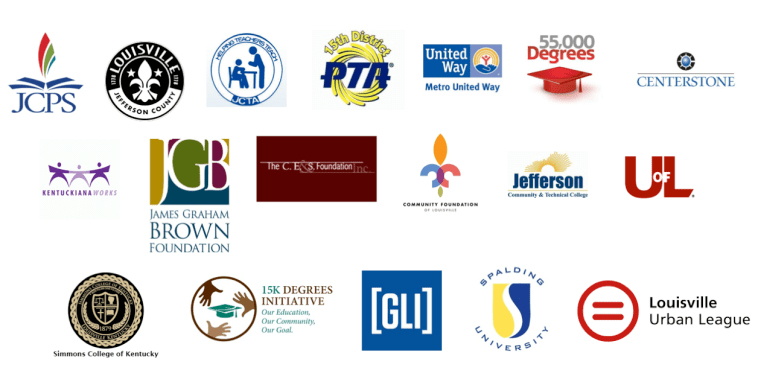A coalition of Louisville nonprofits, government and businesses plans to raise money to enable every JCPS graduate obtain a two-year college degree.
By |
A broad coalition of Louisville nonprofits, government and businesses plans to raise tens of millions of dollars to enable every Jefferson County Public Schools graduate to obtain at least a two-year college degree.
The effort, called Louisville Promise, is in its early stages, but organizers hope to raise funds from local philanthropic organizations, governments, wealthy donors and local residents to cover tuition costs and fees that remain after scholarships and federal and state grants.
Partners include 55,000 Degrees, Louisville Mayor Greg Fischer and the local chamber of commerce, Greater Louisville Inc.

“It’s a very ambitious partnership,” said Mary Gwen Wheeler, executive director of 55,000 Degrees, a public-private partnership that wants to add 40,000 bachelor’s and 15,000 associate degrees by 2020 to prepare the community and its residents for the jobs of the future.
The yet-to-be formed scholarship board — Louisville Promise is seeking a champion to lead it — also will determine whether the scholarship would pay remaining costs only for local two-year colleges or for the first two-years of four-year institutions. Those decisions would have a significant impact on the amount and number of available scholarships, Wheeler said — or on the amount of money that the partners need to raise.
She said organizers hoped to raise enough money for an endowment to keep the effort going for 20 years. The first scholarships could be available for the graduating class of 2019.
This spring, more than 6,300 seniors graduated from JCPS. Generally, about half attend college, and close to 1,000 attend two-year colleges.
Wheeler said that the scholarships would be part of a data-based analysis that would maximize resources to improve the college graduation rate. That means students from low-income families or first-generation college attendees will receive more comprehensive help, including access to mentors who can help them overcome some of the challenges that other students do not face.
“We know that in some cases we want this to really address equity as well as access,” Wheeler said.
55,000 Degrees and other organizations have tried to raise educational attainment through efforts including mentors. Some students graduate from high school in the spring with plans to attend college in the fall — but never follow through because they lack guidance and support from older siblings or mentors. This so-called summer melt has been reduced by a local program that partners mentors with potential college students to encourage them with “text nudges” and guide them through complex education bureaucracy.
Sixteen organizations, including the James Graham Brown Foundation, the Louisville Urban League and the University of Louisville, have signed a memorandum of understanding to create Louisville Promise.
Lumina Grant
Last week, the Lumina Foundation said that it had named Louisville as a National Talent Hub, a designation that comes with $350,000 in grant funds and other help to boost college graduation rates.
Wheeler said that 55,000 Degrees, Lumina’s local lead partner, was honored to receive the accolade, especially because it indicates that Lumina has identified Louisville as a community that understands that talent is the key to economic growth and requires education beyond high school.
Despite those efforts, however, educational attainment of Louisville’s working population fell in 2016, for the first time in five years, to 42.3 percent, down from 44.7 percent.
Some cities that 55,000 Degrees has identified as Louisville’s peers struggled as well — shares in Richmond, Va., fell to 49 percent, down 1 percentage point, and in Cincinnati remained flat at 47 percent — though others showed improvement: The share of college graduates in Indianapolis jumped 2 percentage points, to 40 percent; and in Nashville, rose 1 percentage point, to 47 percent. Nationwide, the share rose 1 percentage point, to 41 percent.
Wheeler cautioned that drawing conclusions from what may be a one-year aberration may be premature, but she said that the improving economy and rising tuition costs might contribute to keeping people out of college.
In an improving economy, jobs are more readily available than in a recession, which generally reduces people’s incentives to obtain college degrees. In the first quarter of this year, KentuckianaWorks reported online job postings in Louisville of 27,620, with nearly three-quarters requiring no college degree.
Wheeler said she worried, though, that most of those jobs pay $12 to $15 per hour and are among the first to disappear in an economic downturn. During the most recent recession, the unemployment rate for people with no education beyond high school peaked at 11 percent. For people with a bachelor’s degree, the rate peaked at 5 percent, according to the U.S. Department of Labor.
Wheeler said that rising tuition costs and stagnant wages also might be undermining the value that students and their parents see in a college education.
According to College Board, a nonprofit, in-state tuition at four-year public universities more than doubled to $9,953 last year from about $4,500 in 2004/2005. At the University of Louisville, in-state tuition has more than tripled since 2001.
The latest three-year Lumina grant will help fund existing 55,000 Degrees programs, Wheeler said, but also will fund new initiatives that focus on collaboration among stakeholders and hire coaches that help Jefferson County students, particularly disadvantaged ones, obtain a college education.
Source: Local coalition aims to fund two-year college tuition for every JCPS graduate – Insider Louisville


